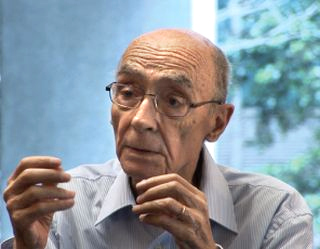José Saramago: Citáty v angličtine
Abençoem-se antes um ao outro, é quanto basta, pudessem ser todas as bênçãos como essa.
Zdroj: Baltasar and Blimunda (1982), p. 175
A vida é assim, está cheia de palavras que não valem a pena, ou que valeram e já não valem, cada uma que ainda formos dizendo tirará o lugar a outra mais merecedora, que o seria não tanto por si mesma, mas pelas consequências de tê-la dito.
Zdroj: The Cave (2000), p. 28 (Vintage 2003)
“No life is without its lies.”
Zdroj: All the Names (1997), p. 172
“Our biggest tragedy is not knowing what to do with our lives.”
Nossa maior tragédia é não saber o que fazer com a vida.
During the opening lecture of the course Literature and power. Lights and shadows, in the University Carlos III in Madrid. As quoted by Marco Aurélio Weissheimer in the article Saramago prega retorno à filosofia para salvar democracia, na Agência Carta Maior. (January 19th, 2004)
“Doesn't anybody understand that killing in the name of God only makes Him a murderer?”
Interview with Edney Silvestre, 2007.
“Perhaps only in a world of the blind will things be what they truly are.”
Zdroj: Blindness (1995), p. 126
O meu problema, nesta situação, é saber se já deveria ter corado antes, ou se é agora que devo corar, Lembro-me de a ter visto corar uma vez, Quando, Quando toquei na rosa que estava no seu gabinete, As mulheres coram mais que os homens, somos o sexo frágil, Ambos os sexos são frágeis, eu também corei, Sabe assim tanto da fragilidade dos sexos, Sei da minha própria fragilidade, e alguma coisa da dos outros.
Zdroj: The History of the Siege of Lisbon (1989), p. 219
Em profunda escuridão se procuraram, nus, sôfrego entrou nela, ela o recebeu ansiosa, depois a sofreguidão dela, a ânsia dele, enfim os corpos encontrados, os movimentos, a voz que vem do ser profundo, aquele que não tem voz, o grito nascido, prolongado, interrompido, o soluço seco, a lágrima inesperada, e a máquina a tremer, a vibrar, porventura não está já na terra, rasgou a cortina de silvas e enleios, pairou no alto da noite, entre as nuvens, pesa o corpo dele sobre o dela, e ambos pesam sobre a terra, afinal estão aqui, foram e voltaram.
Zdroj: Baltasar and Blimunda (1982), pp. 255–256
“It’s is the old who age a day every hour”
Zdroj: The Cave (2000), p. 85 (Vintage 2003)
“Consciences keep silence more often than they should, that's why laws were created.”
The Registrar
All the Names (1997)
Nobel Lecture (1998)
Zdroj: The Year of the Death of Ricardo Reis (1993), p. 47
“Ah, who will write the history of what might have been?”
Fernando Pessoa (as Álvaro de Campos), quoted by José Saramago in The Stone Raft (1986), p. 9
Misattributed
Zdroj: The Year of the Death of Ricardo Reis (1993), p. 117
“That it’s possible not to see a lie even when it’s in front of us.”
Zdroj: All the Names (1997), p. 210
